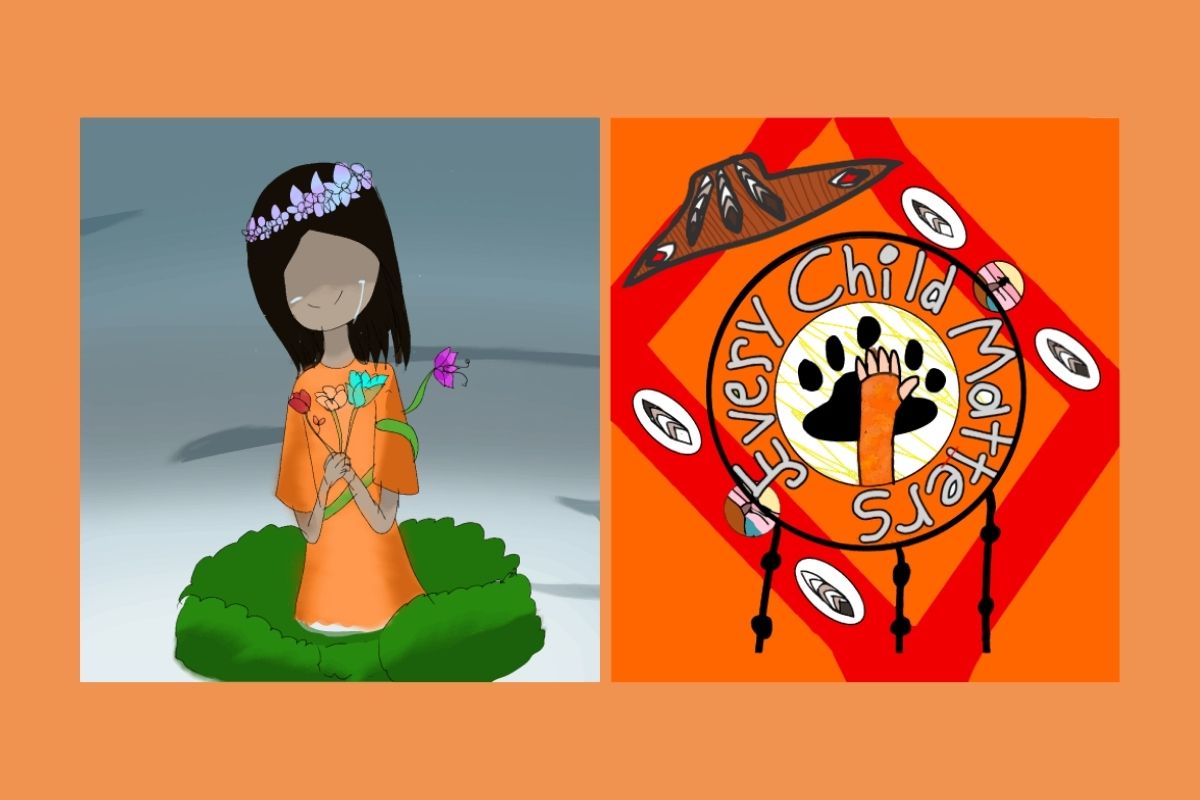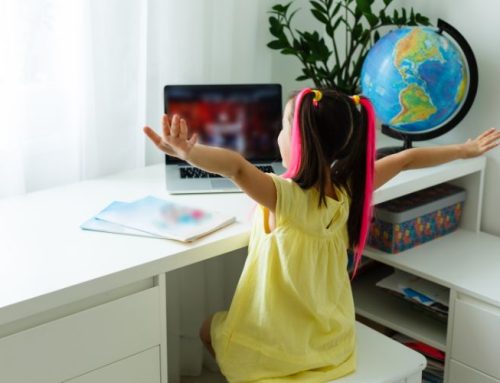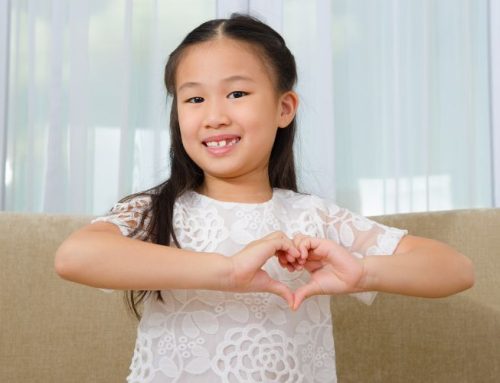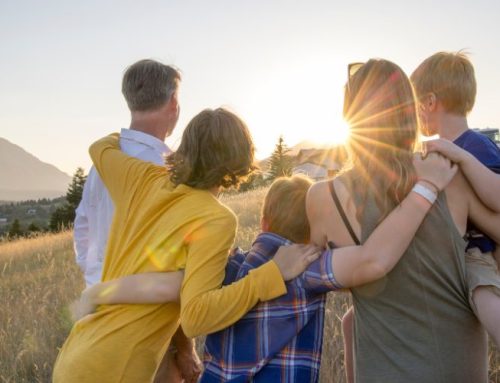Two SelfDesign® learners who took part in a recent healing circle hosted by the Footholds Learning Centre in Nanaimo, British Columbia, to mourn the children lost and harmed at the former Kamloops Indian Residential School and other residential schools across Canada wore their orange shirts with quiet pride while they were grieving.
Jessica (grade 9) and Lacey (grade 8) wore orange t-shirts they had each designed for SelfDesign’s Orange Shirt Day T-Shirt Design Contest last fall.
“I believe that ALL children, families and cultures matter,” says Jessica, a member of the Skyway (Shxwha:y) Village who began her learning journey with SelfDesign Learning Community and Footholds Learning Center in 2015.
“People matter. People need to understand that residential schools were real. Our right to be who we are was denied to us for over a century. Many people don’t understand how this history has hurt Indigenous people, but I believe that occasions like Orange Shirt Day help them to listen better.”
Orange Shirt Day t-shirt design contest
Orange Shirt Day grew out of a residential school commemoration and reunion that took place in 2013 in Williams Lake, B.C. Every September 30 since then, Orange Shirt Day has provided an opportunity for all youth to join their voices to those of other Canadians to remember the residential school experience, to witness and honour the healing journey of residential school survivors and their families, and to commit to the ongoing process of reconciliation.
The SelfDesign Orange Shirt Day T-Shirt Design Contest was one of many Orange Shirt Day activities offered by SelfDesign last September. For the contest, learners were invited to submit designs for an Orange Shirt Day t-shirt. All SelfDesign learners were then invited to vote on the designs.
Jessica’s and Lacey’s designs tied for first place.
SelfDesign Indigenous Education Facilitator Patricia Collins thanks all learners who shared their designs.
“All the designs are awesome,” she says, “and we were so excited to share them with the community.”
Both Jessica and Lacey take part in art therapy classes at Footholds Learning Center. The center offers a variety of therapy and other support services for youth and families with high and low incidence needs.
“It was amazing that my classmate also was chosen,” Jessica says. “Congratulations to everyone who took the time to enter theirs. I think they all looked awesome.”
Jessica’s design
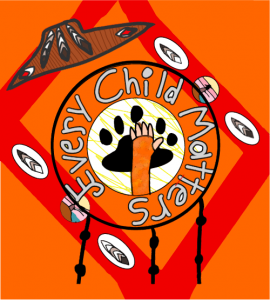
Jessica drew on her First Nations heritage for her design. Her design started with the idea of the fishing hat, she says. Her birth family is from Shxwha:y Village, a First Nations community located near Chilliwack, B.C., in Stó:lō and Ts’elxwéyeqw traditional territory, where fishing has always been integral and important part of the community’s culture, economy and wellbeing.
“However, as I put my design to the story of the Orange Shirt, I knew that it needed more,” she says. “The Bear claw matters to me, as my father told me many stories of the bear, and it speaks of silence and bravery and strength and protection. The hand represents all Indigenous people wanting to be heard. The feather, a gift from above, reminds me that many generations were hurt and we need time to heal. We need to be heard, and we need to heal, and we need to relearn so much of what we lost.”
When she heard the community had chosen her design, Jessica immediately texted her mother to tell her. “My birth family lives in my soul,” she says. “My adoptive family love and care for me daily and live in my heart. They want me to be connected with my culture. They understand my need to be connected and to learn more.”
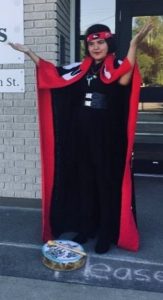
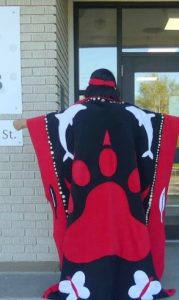
Lacey’s design
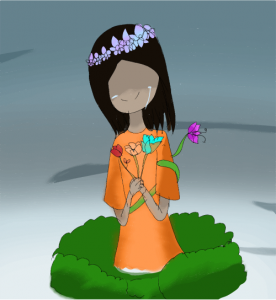
Lacey started at SelfDesign Learning Community and Footholds Learning Center in grade one and enjoys art, cooking, knitting, animation and video games. She says she wanted to take part in the competition after learning about Orange Shirt Day and what it means.
“I wanted to honor the ones who were hurt and the ones who didn’t make it,” she says. “When the Orange Shirt contest was around, feelings were heavy on me when I was drawing the image, I felt bad for the children who didn’t make it, the children who couldn’t see their families.”
Her t-shirt design represents freedom. “I was trying to depict some of the emotions of the survivors who made it out, the emotions of ‘Freedom’ and ‘Being here’. Whenever I look at a garden or a field of flowers, I always think they represent freedom or depict a special meaning, which is why there were some flowers in the image.”
Standing together for reconciliation
Thanks to the talents of these two learners, two beautiful styles of t-shirts are now available for purchase on SelfDesign’s new online store. Distributions from the proceeds of t-shirt sales will be guided by the SelfDesign Indigenous Education team and used to further reconciliation efforts.
On Orange Shirt Day and on any other day when the community pauses and gathers to remember the story of residential schools in Canada, SelfDesign learners, educators and contractors can wear the t-shirts with pride and hope as we stand together for reconciliation and share our commitment to a future of healing, supportive relations for new generations.
As Jessica says, “If we want people to listen, then we must share our stories in a way that makes people want to learn. I think that many more people are asking questions now. I think that many non-Indigenous people are proud to learn more and wear our orange shirts because it means they are starting to understand.”
~
Purchase a t-shirt: Jessica’s design, Lacey’s design.
Learn more about Indigenous Education and reconciliation at SelfDesign

